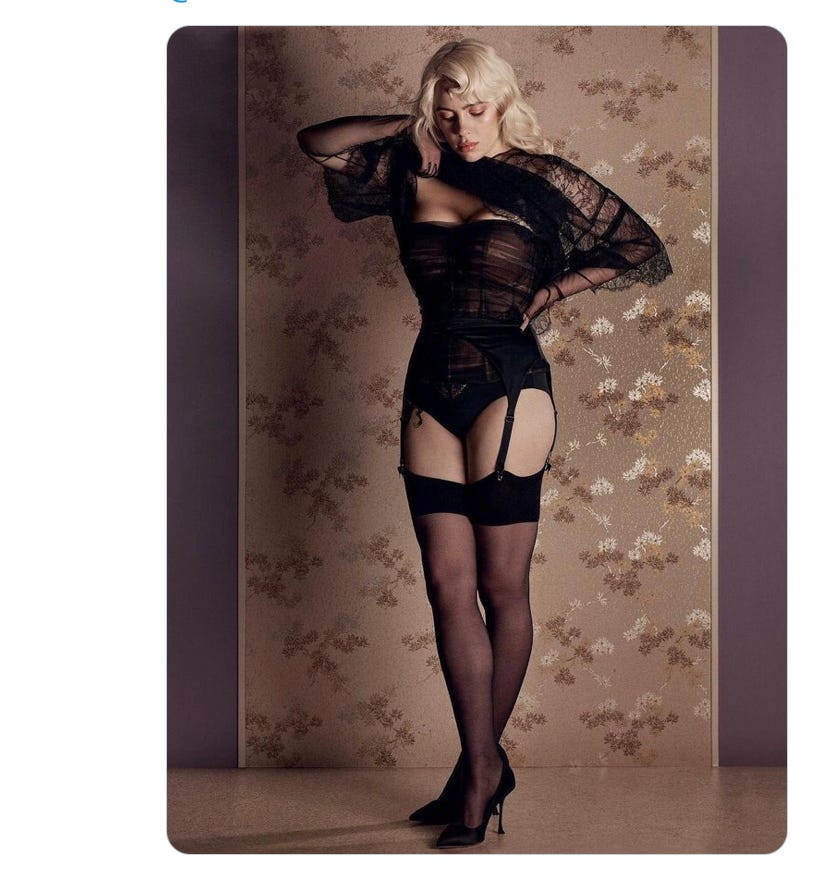How SHOULD Middle-Aged Men Talk about Billie Eilish?
(Billie Eilish, British Vogue, May 2021)
Billie Eilish, the 19 year-old music superstar famous for clever lyrics and (until recently) a penchant for sweatpants, did a career-altering interview in British Vogue last week. It quickly became the most-viewed story in the storied magazine’s history — and it attracted a fair amount of controversy. Many Eilish fans (and their parents) had celebrated the young singer’s refusal to display her body as a testament both to the fragility of her youth and her own feminist impulses. You can be a young woman, sweep the Grammy awards, and never show cleavage is the sort of message that some anxious moms and dads find very reassuring. For some, Billie’s Vogue bit — with her custom-made corsets and teased hair — felt very close to a betrayal.
Among those who did not feel particularly betrayed was Daniel Drezner, a professor at Tufts and a well-regarded contributor on foreign policy issues to the Washington Post. Drezner is about my age, and is not normally a commenter on pop music. On Thursday, he tweeted:
Though he got her age wrong, Drezner’s point about Billie should have been obvious. Middle-aged men are wise to avoid saying anything about Billie Eilish’s interview, much less her photos, lest they be labeled predatory. He was too clever by half — all anyone read was his reference to Eilish’s “slamming body” and Twitter erupted in a condemnation of Drezner’s indefensible, perverted leering.
The celebrated Canadian feminist writer Roslyn Talusan took less than three hours to go straight to Drezner’s employer, the Fletcher School of Diplomacy at Tufts:
(Remember, ‘cancel culture’ doesn’t really exist, right?)
Drezner deleted his tweet with an apology. For now, he seems likely to keep his teaching job, but given that it is 2021, one shouldn’t bet on it. We can be reasonably confident the chastened professor will not refer to Billie Eilish’s figure ever again.
The lesson is an obvious one: it is deeply unwise for older men to ever comment on younger women’s bodies. That’s a sea-change from an earlier era, and not necessarily an unwelcome one. Leering and catcalls should be unacceptable, whether they are targeted at women in their late teens or their late 40s. Whether Drezner’s tongue was in his cheek or hanging from his mouth when he described Eilish’s body as “slamming” (1985 called, and it wants its idioms back), he ought to have read the room of this reckon-filled year and bit that tongue instead.
So is the answer, then, that middle-aged men ought to pretend not to notice the Vogue article? Should they say nothing? (Yes, nothing is good; more nothing, please! I hear a lot of you saying.) If they do find Billie Eilish to be sexually appealing, should they pretend otherwise? Is the best course of action for men my age and Drezner’s to pretend that we are only sexually attracted to our chronological peers, and wouldn’t dream of allowing ourselves to be attracted to someone so much younger? (Again, a lot of you are probably saying, My dude, yes please! More of that ‘shutting up’ would be most welcome.)
I am told that this is less of a problem for the young, but Gen X and Boomer men came of age in a deeply homophobic society. We were told that if we spoke of women, we needed to speak of them primarily in terms of our sexual attraction to them. We were told that we could not have aesthetics without desire — because that would be gay. We couldn’t say a girl was beautiful without also expressing a desire to sleep with her. In the rigid masculine economy in which Daniel Drezner and I were raised, there could be no appreciation without sexualization. If you said, “I think so-and-so is gorgeous, but I don’t particularly want to sleep with her,” you’d be labeled gay as an alpaca.
The “fear of faggotry” robs men of a vocabulary for admiration, and it robs everyone else of what ought to be the obvious realization that men can appreciate beauty without wanting to fuck it.
I look at Billie Eilish’s photos in Vogue and I say, “My goodness, what a transformation. She looks absolutely stunning.” I’ve always found the word “stunning” to be especially useful — it reveals great admiration while remaining entirely silent about what else might or might not be attached to that praise. Someone can be stunned with delight, or stunned with dismay, or stunned with sheer uncomplicated surprise. It’s a word that allows me to acknowledge that I am a visual person who has noticed something and reacted to it, without needing to attach a declaration or denial of sexual desire.
Look, if you can’t say anything about Billie Eilish’s photos without telling us that she turns you on, then indeed, it’s best to say nothing at all. Yet in this season of reckonings and epiphanies galore, it might be helpful for men of my generation to realize we owe it to ourselves and to those around us to let go of our inarticulateness and internalized homophobia when confronted with beauty. Whether or not we find Eilish sexually desirable in her current incarnation, let her pictures be a practice session in describing female beauty in terms that are neither censorious nor concupiscent.



